The Museum Collections
Introduction
I. History and Art Collection
1. Icons of the 14th – 19th centuries
icons of the 14th – 17th century
2. Jewelry art of the 14th – 20th century
jewelry art of the 14th – 17th century
jewelry art of the 18th – 19th century
the european silver 14th - 19th centuries
3. Small-size sculptures (works of metal, wood, bone)
XI – the beginning of the XX century
Small-size sculptures 11th – 17th century
Small-size sculptures 18th – early 20th century
enamel of Troitza masters 15-8th – early 20th century
5.Embroidery, lace, textiles of the 14th - early 20th century
icon and ornamental embroidery
gold and silver lace
6.Painting of the 18th – 21st centuries
painting of the 18th – 19th centuris
painting of the 20th – 21st centuris
II.Manuscripts and old printed books of the 14th – 17th century
IV.Lithography of the 18th – 19th century
V.Numismatics
VI.Medals of the 18th - early 20th century
VIII.Archeology collection
IX. Russian folk and applied and decorative art of the 17th – 21st c.
1. Artistic wood
folk carved and painted wood
wooden toys
house carving of Sergiev Posad
Khokhloma and Gorodets painting
2. Artistic textiles
embroidery and weaving
printed textiles and lace
Russian shawls
folk costumes
folk garments
printed cotton kerchiefs
|
Russian shawls 18th – 20th century (P. 2)
|
On a boundary of the 19-20th centuries "Turkish" patterns all are less often applied at printed of scarves and shawls. Its change the intricate garlands framing magnificent bouquets of bright roses, tulips, field flowers. Central part is filled with seldom located small florets, berries.
All these changes can be tracked on the shawls which were issued by kerchief-printed factory of J. Labzin in Pavlovsk Posad - one of the largest Russian kerchief-printed enterprises having an old story and developed traditions. Since 1863 Labzin’s factory one of the first begun mass production of pure-wool and half-woollen printed scarves and shawls, becoming the supplier of this production in country home market.
|
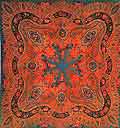
Shawl. Late of 19th century. Russia. Printed textiles |
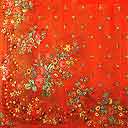
Shawl. Late of 19th century. Manufactory of Givartovsky and Ê0. Printed textiles |
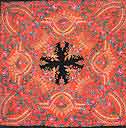
Shawl. by Postigov N.S. Late of 19th century. Moscow province. Pavlovsky Posad. Printed textiles |
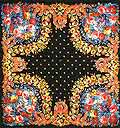
Shawl. 1885. Labzin's manufactory. Pavlovsky Posad. Printed textiles |
That fact testifies to high quality of Pavlovo-Posad scarves and shawls that at the All-Russia art-industrial exhibition of 1882 they have been noted by a silver medal, in 1896 at the All-Russia art-industrial exhibition in Nizhni Novgorod - the highest award - the Big arms. At the factory worked such known draughtsmen as Postigov S.V. & Abolihin K.E.
In a Soviet period the Pavlovo-Posad manufactory became one of the most known in the country. In 1928 the first art exhibition of household Soviet textiles has taken place. Then Pavlovo-Posad’s shawls were exhibited on the World's fair in Paris in 1937. At the factory worked such known draughtsmen as Postigov S.V. & Abolihin K.E. Burning colour of Pavlovsk scarfs is created thanks to sharp contrast of colour of a pattern to a background. Rich colours of flower patterns get surprising sonority, seem fresh and live.
|
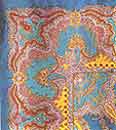
Scarf on ancient drawing.1964. Fragment. Moscow Region. Pavlovsky Posad. Printed textiles |
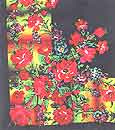
Scarf on ancient drawing. Soil with a shade. 1958. Fragment. Moscow Region. Pavlovsky Posad. Printed textiles |
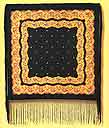
Shawl. By Abolikhin K.E. 1958 Moscow Region. Pavlovsky Posad. Printed textiles |
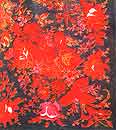
Shawl "Fiery". By Postigov N.S. 1964. Moscow Region. Pavlovsky Posad. Printed textiles |
|
After war at the factory there were gifted artists, such as Shtyhin E.I., Ryzhov S.P., Olshevskaya Z.À. In weaver's manufacture the manual printed texstiles was replaced with automatic machine tools. And today, in the 21st century, Pavlovo-Posad’s scarves are distinguished by completeness of composite decisions, a combination of a geometrical and vegetative pattern, a variety of vegetative forms, juiciness of colour, a thin accurate contour and careful study of the smallest details
|
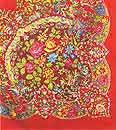
Shawl. By Abolihin K.E. 1958. Moskow Region. Pavlovsky Posad. Printed textiles |
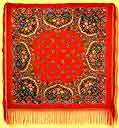
Shawl "Medallions". By Shtyhin E.I. 1960. Moskow Region. Pavlovsky Posad. Printed textiles |
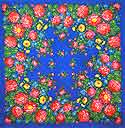
Shawl. Ryzhov S.P. 1960-1970. Moskow Region. Pavlovsky Posad. Printed textiles |
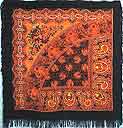
Shawl "Paradox". By Olshevskaja Z.A. 1990th. Pavlovsky Posad. Printed textiles |
|


